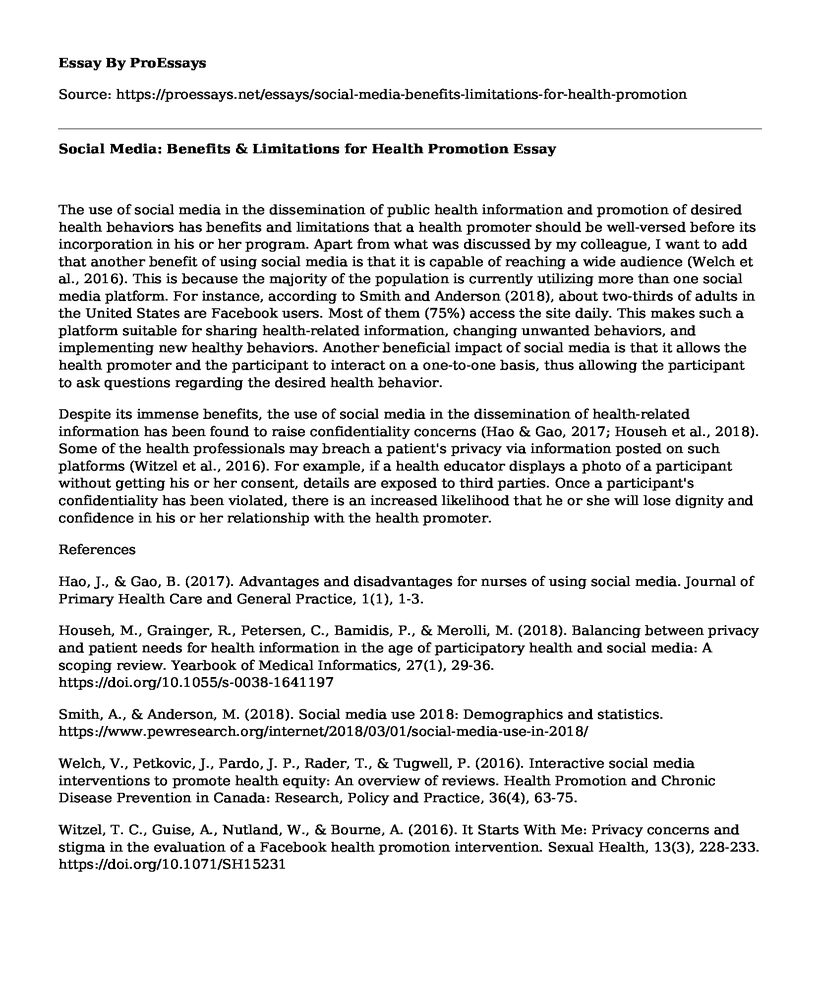The use of social media in the dissemination of public health information and promotion of desired health behaviors has benefits and limitations that a health promoter should be well-versed before its incorporation in his or her program. Apart from what was discussed by my colleague, I want to add that another benefit of using social media is that it is capable of reaching a wide audience (Welch et al., 2016). This is because the majority of the population is currently utilizing more than one social media platform. For instance, according to Smith and Anderson (2018), about two-thirds of adults in the United States are Facebook users. Most of them (75%) access the site daily. This makes such a platform suitable for sharing health-related information, changing unwanted behaviors, and implementing new healthy behaviors. Another beneficial impact of social media is that it allows the health promoter and the participant to interact on a one-to-one basis, thus allowing the participant to ask questions regarding the desired health behavior.
Despite its immense benefits, the use of social media in the dissemination of health-related information has been found to raise confidentiality concerns (Hao & Gao, 2017; Househ et al., 2018). Some of the health professionals may breach a patient's privacy via information posted on such platforms (Witzel et al., 2016). For example, if a health educator displays a photo of a participant without getting his or her consent, details are exposed to third parties. Once a participant's confidentiality has been violated, there is an increased likelihood that he or she will lose dignity and confidence in his or her relationship with the health promoter.
References
Hao, J., & Gao, B. (2017). Advantages and disadvantages for nurses of using social media. Journal of Primary Health Care and General Practice, 1(1), 1-3.
Househ, M., Grainger, R., Petersen, C., Bamidis, P., & Merolli, M. (2018). Balancing between privacy and patient needs for health information in the age of participatory health and social media: A scoping review. Yearbook of Medical Informatics, 27(1), 29-36. https://doi.org/10.1055/s-0038-1641197
Smith, A., & Anderson, M. (2018). Social media use 2018: Demographics and statistics. https://www.pewresearch.org/internet/2018/03/01/social-media-use-in-2018/
Welch, V., Petkovic, J., Pardo, J. P., Rader, T., & Tugwell, P. (2016). Interactive social media interventions to promote health equity: An overview of reviews. Health Promotion and Chronic Disease Prevention in Canada: Research, Policy and Practice, 36(4), 63-75.
Witzel, T. C., Guise, A., Nutland, W., & Bourne, A. (2016). It Starts With Me: Privacy concerns and stigma in the evaluation of a Facebook health promotion intervention. Sexual Health, 13(3), 228-233. https://doi.org/10.1071/SH15231
Cite this page
Social Media: Benefits & Limitations for Health Promotion. (2023, May 08). Retrieved from https://proessays.net/essays/social-media-benefits-limitations-for-health-promotion
If you are the original author of this essay and no longer wish to have it published on the ProEssays website, please click below to request its removal:
- Research Paper on Mechanical Engineering Career Field
- Questions and Answers Essay on Nursing and Drugs
- Essay Sample on Stress and Grade Point Average (GPA)
- Toyota Japan Financial Information for the Years 2016, 2017, and 2018 Paper Example
- Film Analysis Essay on An Interview With God: The Conversation That Shakes Faith
- Oil: A Critical Commodity for Industrial & Construction Needs - Research Paper
- Mental Illness & Imprisonment: A Research Proposal Example







